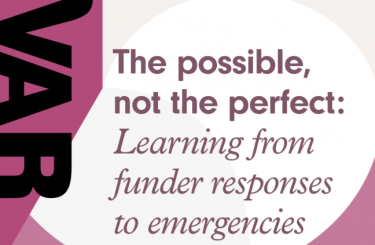Related


In 2018, IVAR and London Funders published a report looking at the key features of funders’ grant-making responses to the Grenfell Tower fire, the London Bridge and Borough Market attacks, and the Manchester Arena bomb.
In response to coronavirus, London Funders is bringing funders together to produce a collaborative and aligned response, supporting the needs of civil society organisations. To inform this response, and ensure that previous insights are not ignored, we have collated what we learnt from past emergencies.
We found that across a number of the collaborative funds set up in response to the emergencies, funders stepped outside their normal practices in a range of different ways, most notably:
These five bullets capture a particular approach to grant-making, one that is sensitive and attuned to beneficiaries. It is highly relational, rather than contractual; it places a premium on trust; and it suggests a kind of common endeavour, where the assets of the funder (in this case, money) are combined with the assets of grantees (their work) for the common good.
‘Being effective’ in these circumstances does not mean delivering a perfect grant programme that no-one can question or criticise.
But it does mean finding a way to direct money quickly and intelligently to where it appears to be most needed – often in a complex and changing situation, where extensive consultation may be impossible. Drawing on the words of organisations and groups in receipt of emergency funding, we can understand ‘effectiveness’ in this context as meaning ‘straightforward, easy, quick and trusting’.
Few of the funders that played a part in the emergency responses expected to be taking on this role.
But they saw a gap in support for community organisations and some independent and public funders decided to step in.
We identified five conditions, principles and ways of working that may now help others get money quickly and intelligently to community organisations:
Over the last decade there has been much talk of funders trying to become less burdensome, more straightforward and quicker in their dealings with applicants and grantees. For that to happen, funders need to be ruthlessly clear about the purpose and necessity of their processes. The positive examples that we have seen – those described in The possible, not the perfect and, more recently, in our account of the Tudor Trust’s work in Hartlepool – weren’t rushed or haphazard. The preparation and execution were characterised by care, attention to detail and great sensitivity. But, critically, they were nimble and proportionate, sending a clear signal to others about what is possible when you are prepared to step outside the normal.
As part of our own efforts at IVAR to support the voluntary sector and civil society, we will be working alongside funders and their funded organisations over the coming months. We are committed to capturing learning about different responses; if you would like to be part of that, please get in touch with emily@ivar.org.uk.
London Funders are coordinating a funder statement on Covid-19, recognising that this outbreak is an exceptional event that will have an impact on civil society groups and to offer reassurance funders stand with the sector during this time. Find out more and sign up here.
This blog is jointly hosted by IVAR and London Funders

